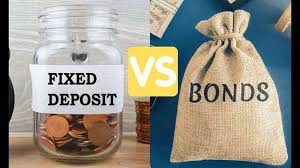When it comes to long-term investments, many people find themselves torn between Fixed Deposits (FD) and Bonds. Both options offer unique benefits and risks, making it crucial to understand their differences before deciding. In this article, we’ll dive deep into the world of FD vs Bonds. By the end, you’ll have a clear understanding of which investment vehicle is better suited for your long-term financial planning.
Understanding Fixed Deposits (FDs)
Get high ROI with 8.8% on Fixed Deposits. Invest today
What Makes FDs Unique?
Fixed Deposits are a popular investment option among risk-averse investors. When you invest in an FD, you deposit a lump sum for a predetermined period at a fixed interest rate. This makes FDs an excellent choice for those who prefer stability and predictability in their investments. With Airtel Finance’s Fixed Deposit, you can enjoy attractive interest rates and flexible tenure options. This is why it is easier to align your investments with your financial goals.
Breaking Down FD Features
One of the key advantages of FDs is the flexibility they offer in terms of interest payouts. You can choose between cumulative or non-cumulative options, depending on your preference. Cumulative FDs reinvest the interest earned, allowing your money to grow exponentially over time. Contrarily, non-cumulative FDs pay out interest at regular intervals, providing a steady income stream.
Airtel Finance’s Fixed Deposit comes with a host of features designed to make your investment journey smoother. For instance, you can easily calculate your potential returns using their online FD interest calculator. This tool helps you plan your investments better. Plus, this they do by giving you a clear picture of the returns you can expect over your chosen tenure.
FDs and Risk Management
When it comes to risk, FDs are generally considered safer than Bonds. This is because FDs are not directly affected by market fluctuations, ensuring that your principal amount remains protected. In India, the Deposit Insurance and Credit Guarantee Corporation (DICGC) insured the FDs upto ₹5 lakh per depositor per bank. This adds an extra layer of security to your investments.
Exploring the World of Bonds
Understanding Bond Basics
Bonds are debt instruments issued by companies, governments, or municipalities to raise funds from investors. When you invest in a bond, you essentially lend money to the issuer. The provider promises to pay you interest on the principal and return the principal amount at maturity. Bonds offer variable returns based on market conditions and the issuer’s creditworthiness. This is why they are a more dynamic investment option compared to FDs.
Bonds and Risk Appetite
While bonds can potentially offer higher returns than FDs, they also come with higher risks. The returns on bonds are influenced by various factors such as interest rate fluctuations, credit risk, and liquidity risk. Corporate bonds, for instance, are riskier than government bonds due to the credit risk associated with the issuing company. Nevertheless, for investors willing to take on some risk in exchange for potentially higher returns, bonds are an attractive option.
Bond Varieties and Tenures
Bonds come in various types and tenures, catering to different investment strategies. Government bonds, such as Treasury Bills and State Development Loans, are considered one of the safest investment options. It is because they are backed by the government. Conversely, corporate bonds are issued by companies and offer higher interest rates but also carry higher credit risk.
Bond tenures can range from a few days to several decades. That’s why they are suitable for both short-term and long-term investment horizons. This versatility allows investors to choose bonds that align with their specific financial goals and timelines.
Comparing FD and Bonds
Returns and Risk Trade-off
When comparing bond vs fixed deposit, it’s crucial to consider the returns and risk trade-off. FDs offer guaranteed returns. This makes them ideal for risk-averse investors who prioritize capital protection. However, the returns on FDs may not always keep pace with inflation, especially in the long run.
Bonds, on the other hand, have the potential to offer higher returns than FDs, particularly corporate bonds. Nonetheless, this comes with a higher degree of risk. Various market factors influence bond returns, and there is always the possibility of the issuer defaulting on their payments.
Taxation Implications
Taxation is another crucial factor to consider when choosing between FD and Bonds. Interest earned on FDs is taxable as per your income tax slab. Meanwhile, bonds may offer tax benefits depending on the type of bond. For instance, interest earned on certain government bonds, like the PPF and National Savings Certificate (NSC), is tax-exempt.
It’s important to consult with a tax expert or financial advisor to understand the tax implications of your investments. Then, make an informed decision based on your specific tax situation.
Liquidity and Premature Withdrawal
Liquidity refers to how easily you can convert your investment into cash. In terms of liquidity, bonds have an edge over FDs. Bonds can be traded on the secondary market, allowing investors to sell their holdings before maturity if needed. But, the liquidity of bonds depends on factors such as market demand and the bond’s credit rating.
FDs, on the other hand, are less liquid as premature withdrawals often attract penalties. Some banks, including Airtel Finance, offer premature withdrawal facilities with lower penalties, providing some flexibility to investors. Yet, it’s necessary to read the terms and conditions carefully before investing in an FD.
Diversification Benefits
Diversification is a key principle of investing that helps manage risk by spreading your investments across different asset classes. Investing in both FD and Bonds can help diversify your portfolio, reducing the overall risk.
For instance, you can allocate a portion of your long-term investments to FDs for stability and guaranteed returns. You can do this while investing another portion in bonds for potentially higher returns. This approach allows you to balance risk and reward based on your financial goals and risk tolerance.
Knowing the difference between bond and FD for long-term investments ultimately depends on financial goals, risk appetite, and investment horizon. FDs offer stability and guaranteed returns, making them suitable for risk-averse investors who prioritize capital protection. On the other hand, bonds have the potential to offer higher returns but come with higher risks.
To make an informed decision, consider factors such as returns, risk, taxation, liquidity, and diversification benefits. It’s also essential to do thorough research and consult with a financial advisor. All these will aid you in understanding which option aligns best with your specific financial situation.
If you’re looking for a trusted partner for long-term investments, Airtel Finance offers a range of fixed deposit options. They have attractive interest rates and flexible tenures. With their user-friendly online platform, you can easily compare interest rates. You can also calculate returns using their FD interest calculator and start investing in just a few clicks.
Remember, the key to successful long-term investing is to create a well-diversified portfolio that balances risk and reward. Understanding the comparison bonds vs FD and making informed decisions paves the way for a financially secure future.
Get high ROI with 8.8% on Fixed Deposits. Invest today
FAQs:
1. Can I diversify my investments using both FD and Bonds?
Yes, investing in both FD and Bonds can help diversify your portfolio and manage risk. You can allocate a portion of your investments to FDs for stability and another to bonds for potentially higher returns.
2. Are Bonds riskier than Fixed Deposits?
Yes, bonds are generally riskier than Fixed Deposits. Bond returns are influenced by market factors, credit risk, and liquidity risk. Meanwhile, FDs offer guaranteed returns and are insured up to ₹5 lakh per depositor per bank in India.
3. What are the tax implications of investing in FD versus Bonds?
Interest earned on FDs is taxable as per your income tax slab. Some bonds, such as government bonds like PPF and NSC, offer tax benefits. It’s essential to consult a tax expert to understand the specific tax implications based on your situation.
4. Which is more suitable for long-term investments: FD or Bonds?
The suitability of FD vs Bonds for long-term investments depends on your risk appetite and financial goals. FDs offer guaranteed returns and are suitable for risk-averse investors. In contrast, bonds have the potential for higher returns but come with higher risks.
5. What distinguishes Fixed Deposits (FD) from Bonds?
Fixed Deposits are savings instruments where you deposit a lump sum for a fixed tenure at a predetermined interest rate. Bonds are debt instruments companies or governments issue to raise funds. It comes with a promise to pay interest and return the principal at maturity.



